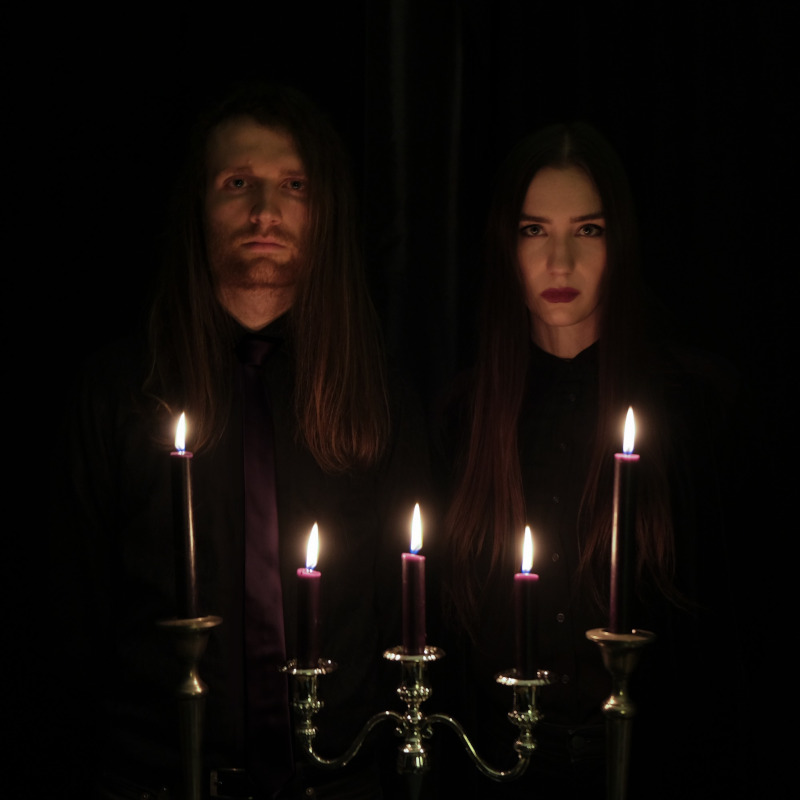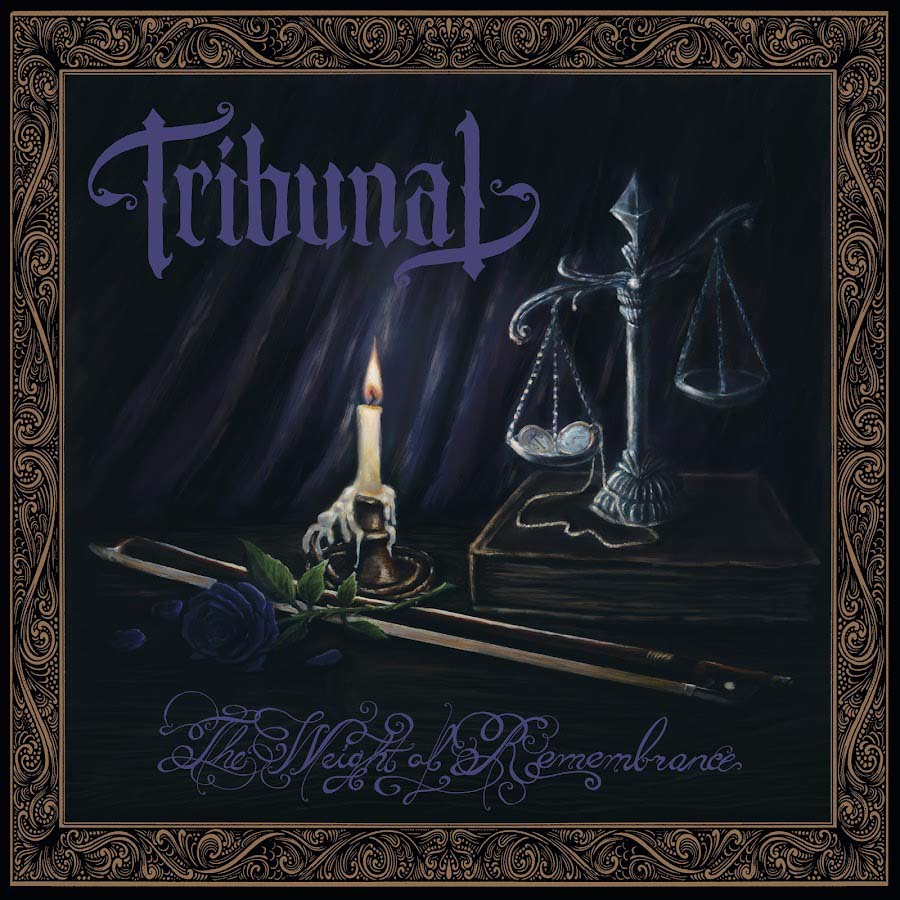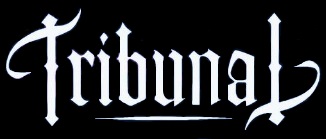When a label chooses a first release of the year it sets the tone for what’s to come in a very real way. Vancouver, British Columbia’s TRIBUNAL were bestowed that honor by 20 Buck Spin, and now bestow upon us a crippling yet cathartic trip through gothic doom/death with debut The Weight Of Remembrance.

DEEP INTO DREAMS
Interview With Soren Mourne [Cello/Bass/Vocals] and Etienne Flinn [Vocals/Guitars]
Interview By: Lord Randall
Rebel Extravaganza: First things first, congratulations on the album’s completion, and for (even on first listen, or me) presenting an “album experience” more so than a “collection of songs”. When the songs that would become The Weight Of Remembrance started taking shape did you already feel the end result beckoning?
Soren Mourne: I’m glad to hear that you found the album to work as a whole. The songs that made it onto the record arose as part of the process of finding our sound and identity and include the very first songs we wrote together. The coherence of the album came about naturally given the period of time they were written in, both in relation to where we were musically and in other aspects of our lives. We came to realize that we had the makings of an album before we had seriously started contemplating a record, which came as a bit of a surprise. However, once we started envisioning the record as a whole, the full picture came together quite clearly.
RX: Do you see digital singles as kind of the way forward in these “click-listen for 10 seconds-move on if you don’t like it” times? Sure, there will always be the old guard, who see the album as an experience, something to invest time in listening to completely, but with the deluge of bands/releases brought by the availability of home recording and self-releasing, getting people (of any age) interested has become that much more difficult.
SM: I am biased, being an extreme example of an album listener myself. I almost always listen to albums in their entirety when I put a band on and have subjected many of my friends to this insistence against their will over the years. To me, albums are portraits of a band’s identity at a specific time and create an aesthetic and thematic world in themselves. Losing yourself to the inner world of an album is the defining experience of falling in love with a band for me. Returning to that world time and time again to discover new elements or to immerse yourself in the increasingly personal collection of feelings and images associated with a record is the ultimate connection to a band, and it’s hard to see how that can be replicated by the small window into an artist’s sound and vision offered by a single. I can’t conceptualize the music that has shaped me as an artist and as a person without thinking in terms of albums, and I expect I’m not alone in that. I think the fanatical obsession that is a hallmark of the metal world needs more developed pieces of work to fully take form, and when combined with the high proportion of listeners inclined towards complex lore and genre fiction, I think albums will remain paramount.
RX: Do you think that maybe the PR/Publicity firm and social media are in a very real way taking the place of the labels, except for tour support? Labels make money from bands, bands make money from fans, fans buy merch and tickets, and if bands can’t tour, well then there’s the whole circle of life interrupted.
Etienne Flinn: I think this depends on what an artist is looking for from a label. For us, we are relatively inexperienced in the music industry and are not looking to generate income with this project, so having a label with the skill to handle so much of the administrative work involved has been a great experience. While our relationship with 20 Buck Spin is young, we are extremely happy with our collaboration so far.
Of course, I think you’re right that a different band who was looking to make a career could handle much of the label’s roles themselves if they had the skills and could have more control over their finances and profits that way. Even then, though, the credibility that Dave has built with the 20 Buck Spin label is not something that could be replaced with a PR firm.
SM: I don’t think labels are likely to be replaced in a meaningful way by social media or PR, in the metal scene at least. When I find a band I like, finding out what label they are on – if any – is often one of the best ways to identify more bands in a similar vein. This leads to following certain labels and trusting them to put forward a curated collection of artists that are consistently worth listening to. This is especially relevant in a genre with so many niches. I know this is a common phenomenon for metal fans, and I don’t see social media offering a replacement—releasing music by a band requires a lot more commitment than sharing a song in a playlist, which I think listeners take note of. Also, our partnership with 20 Buck Spin arose from submitting our music to them with essentially no social media following, so I hope I’m right for the sake of bands like us who have more to offer with musical creativity than social media skills.
RX: Stepping back a bit, had the core duo of TRIBUNAL crossed paths in the Vancouver musical community before, and just felt the time was right to move forward? It seems it’s almost easier to find members for a traditional band set-up than to find that one or two people you can communicate with (both in and out of music) to the level needed to bring such an idea to fruition.
EF: We met very shortly after we both moved to Vancouver, but it took around a year for us to start discussing a possible collaboration. From there, things developed slowly with us writing music, developing the concept, and gathering other musicians to work with. We have a closely aligned vision for TRIBUNAL and have developed a very trusting working relationship. I think that it can be easier to find that kind of relationship with one or two other people rather than coordinating a full band towards a consistent vision.
SM: It’s also worth noting that we started looking for a drummer and another guitarist once we had some material developed and did expect to pursue a more conventional band arrangement once the new members joined. We loved performing, and Etienne and I remained the central writers throughout our time as a four-piece.
RX: So you’ve got the songs for the album, you’re going in to record, but you have a few other folks included on the record. When crafting the songs did you already have some sort of idea for collaborators you’d want involved, and what led you to the ones that ended up taking part?
EF: We wrote most of the record and performed our first shows with our initial four-person lineup that included our drummer Magdelena and our guitarist Maria. During the pandemic, both of them left the city and we returned to working on the record the way we started, just the two of us. While I recorded all the guitars myself we needed a drummer, and we knew of Julia’s skills through the local scene and reached out to see if she would be interested in helping us complete the record.
Soren has been close to Rory and Claine for many years, and so it was natural to involve both of them when we needed piano and additional vocal textures. Claine brought her own touch to the instrumental piece Soren had written, and as Rory was around for much of the album’s recording we had him add some longer harsh vocals than I can comfortably hit. You’ll hear some of these featured in the opening of ‘Of Crumbled Stone And Creeping Moss’ and in the bridge of ‘Apathy’s Keep’.
SM: I have known Claine Lamb since our youngest days in the metal scene, and she has since developed into an excellent multi-instrumentalist and composer. We have collaborated before–including once for a TRIBUNAL show with her on guitar and for a SUMMONING cover with me on cello – and I was thrilled to feature her piano performance on ‘Remembrance’. She brought her own ornamentations and style to the piece, which really brought it to life.
‘Apathy’s Keep’ was the first song we recorded, and Magdalena recorded drums for it shortly before leaving the city. We wanted to honour her contributions to the song by using her performance while also ensuring that we maintained a consistent sound between tracks, all of which featured Julia’s work recorded at a separate session. The solution we ended up with was sending both Julia and Magdalena’s performances to Markov to blend as they saw fit, leading to the unusual liner note of “additional drums by Magdalena.” It is a bit of a mystery to us as to whose parts are whose, but I hope that both drummers can see themselves reflected in the final mix.
RX: Back in the days of the “Peaceville 3”, and especially in the funeral doom of SKEPTICISM, THERGOTHON, etc, there seemed an element of the liturgical involved, despite the death metal influence. That bloodline seems to still exist today, and The Weight Of Remembrance is one of those records, so it’s appreciated. How does the spiritual (mind, not necessarily “religious”) element of doom factor into the music and lyrical art that’s come from TRIBUNAL thus far?
EF: While we are not necessarily spiritual people, TRIBUNAL seeks to channel the entrancing power of doom into a consuming musical experience that can transport you to another world. There are light touches of liturgical elements in the use of bells in the intro and organs throughout, as well as deeper explorations of these ideas in ‘Without Answer’ as discussed below, but that theme doesn’t permeate our project as much as our interest in justice and morality, guilt and punishment, and right and wrong. Those core themes will be brought to the forefront more on our next record.
RX: Naturally – to me at least – with doom being generally less “gore” influenced than death metal, more focused on the cemetery aspect, the ritual of the funeral, of impending, well…doom…, it’s hard to escape the connection with the afterlife, the spiritual. BLACK SABBATH embraced it, and they thought they were a blues band until people started calling them metal.
EF: While I do love some gore-obsessed bands, it is always despite the blood, rather than because of it. I have never felt those themes to be compelling in metal and would rather produce something that is entrancing, compelling, and transportive, something that finds beauty in the darkness. At the same time, TRIBUNAL is not necessarily interested in hiding from the uglier realities of our existence, and the kinds of rituals you mention can be a way for us to make these realities more legible.
SM: I have a softer spot for classic death metal tropes as somewhat of a horror enthusiast myself, but that type of full-on extremity isn’t something that fits with the mood and themes we are interested in exploring through TRIBUNAL. The type of horror we engage with is more Kafka than Cronenberg – the terror of oppressive forces seemingly beyond our control rather than the terror of embodiment.

RX: How important is the artwork/layout to the finished album for you, especially in the case of the debut? What emotion do you hope the cover image/painting evokes in the first-time listener?
SM: I have always found album artwork to be central to my experience of an album. I am a very visual person and come to associate the album’s imagery and colours closely with its music. Album art that resonates strongly with the music it accompanies allows an album to come across as a fully realized work. This kind of impression is of course particularly important for a new band wanting to make a statement of their artistic identity.
When painting the cover art, I was influenced by Dutch vanitas, a style of still-life paintings featuring elements that symbolize mortality and the passage of time, such as hourglasses, wilting flowers, candles, and skulls, as well as depictions of earthly pleasures, such as musical instruments and books, that are ultimately fleeting. This description could be read as nihilistic, but I don’t see it that way. I hope that the cover, like the music, evokes a sense of somber reflection, but not hopelessness. The candle remains burning and the scales of justice are not fixed.
RX: If you could, go a bit into the lyrical inspiration of ‘Of Creeping Moss And Crumbled Stone’ and ‘Without Answer’…
EF: While I’m not a spiritual person, ‘Of Creeping Moss…’ was the result of what was probably the closest thing I’ve had to a spiritual experience in a long time. During the Vancouver Island Metal Festival a few years ago I found myself alone in the legendary Ross Bay Cemetery at night, and was dwelling on the tombstones there and the lives they represented. I had an intense awareness of the fundamental reality of past lives, that the past was not the past to those who lived it and was rather as real and immediate as 2023 is to me now, the present every bit as vivid and the future as completely uncertain. I suppose this is obvious, but it is so easy to forget that every face in a faded photograph and every trace of life in the archeological record represents a complete life as complex and full as yours or mine, even though that life and so much of what it was entangled in is gone forever. I imagined what I might want to say to one of those past lives, if I were to be able to do so, and how they might respond.
‘Without Answer’ draws from my experiences with the Catholic faith and church I was raised in. Unlike many, I had a largely positive experience with Catholicism, both finding a sense of belonging in the community there and a sense of spiritual purpose in the faith. However, on a philosophical level I would eventually evolve towards an atheism that would fundamentally split me from that community. While there was no dramatic separation, the whole exercise rings quite hollow if you don’t actually believe in God, and this song speaks to the loss of that community and the spiritual certainty that came with it.
RX: Plans for 2023?
EF: We are working on festival and tour appearances in Western Canada and will start to lay the groundwork to travel further afield as opportunities arise. We have already begun work on our second album, with the material sketched out and first drafts of most of the songs composed. This second record will be a much more deliberate construct than our first, both in musical approach and lyrical theme.
